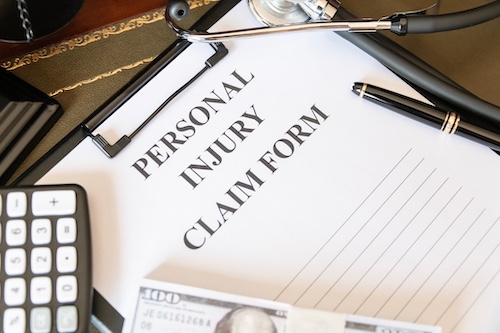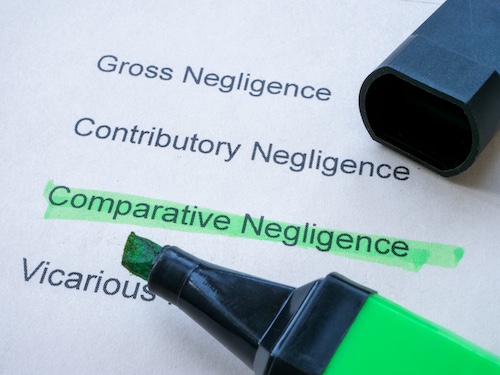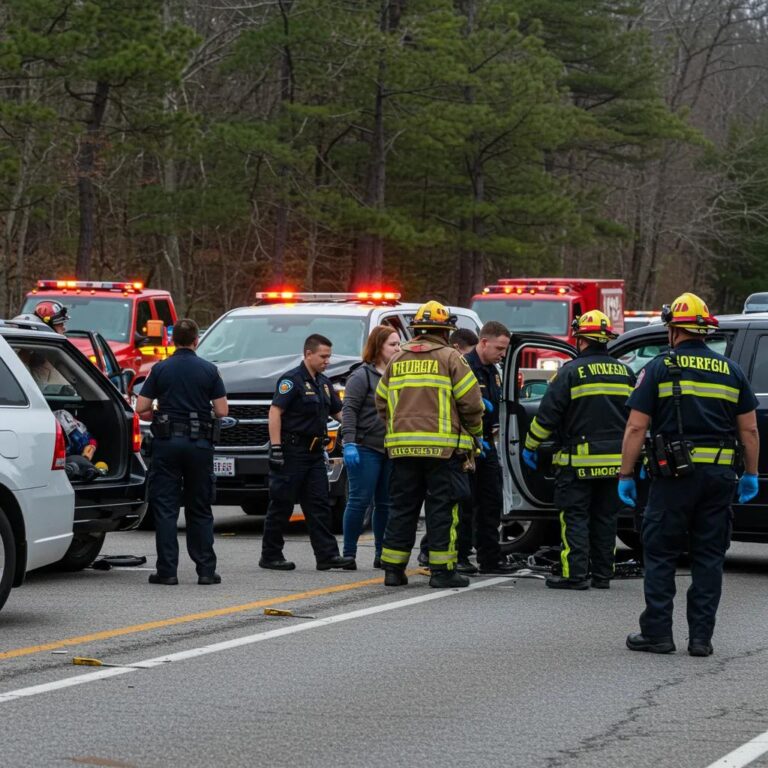Georgia Comparative Negligence Law and Your Case
At GMV Law Group, LLP, we focus on helping accident victims recover compensation for car accidents, truck accidents, motorcycle crashes, wrongful death claims, and other personal injury cases. Based in Atlanta, we guide clients through every step of the legal process, from investigating the accident scene to negotiating with insurance companies and, when necessary, pursuing litigation in court. Our team has recovered millions for injured clients, operates 24/7 with bilingual support, and is committed to protecting the rights of those who have suffered injuries due to another party’s negligence.
Georgia comparative negligence law determines how fault is divided when more than one party is responsible for an accident. For injured parties, this rule directly affects how much compensation can be recovered in personal injury claims, car accidents, and wrongful death cases. If a plaintiff is found partly at fault, their damages are reduced by that percentage, and if they are 50 percent or more at fault, they cannot recover damages at all.
Understanding this rule is essential for accident victims seeking fair compensation, and working with an Atlanta car accident lawyer can help protect your rights under Georgia law.
Understanding Comparative Negligence in Georgia
Comparative negligence is a critical factor in how Georgia courts decide personal injury claims. It determines how responsibility is shared when more than one party contributes to an accident. Knowing how this rule works helps accident victims understand their rights to recover compensation.
What Comparative Negligence Means
Comparative negligence is a rule that assigns fault based on each party’s actions. In a personal injury case, the jury determines the percentage of fault for all involved parties. The plaintiff’s damages are then reduced by their own comparative negligence. For example, if an injured party is 20 percent at fault, their final compensation is reduced by that same percentage.
Georgia’s Modified Comparative Negligence Law
Georgia follows a modified comparative negligence system under O.C.G.A. § 51-12-33. This means a plaintiff can only recover damages if their fault is less than 50 percent. If the plaintiff is 50 percent or more responsible, they cannot claim compensation. This differs significantly from pure comparative negligence states, where even a party 99 percent at fault may still recover damages.
Why the Rule Matters in Personal Injury Cases
Georgia’s comparative negligence law affects how much an injured person can recover in medical expenses, lost wages, and other damages awarded. It also shapes settlement negotiations with an insurance company. Proving negligence with sufficient evidence is vital because insurance adjusters will often argue that the plaintiff failed to exercise reasonable care. An experienced Atlanta car accident lawyer can help present eyewitness statements, police reports, and medical records to minimize the plaintiff’s degree of fault.
How Georgia’s Comparative Negligence Law Works
Georgia’s comparative negligence law sets clear limits on when an injured person may recover compensation in a personal injury action. It focuses on the percentage of fault assigned to each party involved in the accident.
The 50 Percent Bar Rule
Under Georgia law, an injured party can only recover damages if their share of fault is less than 50 percent. If the plaintiff’s negligence reaches 50 percent, they are barred from claiming compensation. This rule is critical for car accident victims, wrongful death claims, and other personal injury cases where fault may be disputed.
Assigning Fault Among Parties
In such cases, the jury determines how fault is divided. The process considers the actions of each party responsible, including the plaintiff, the defendant, and sometimes multiple parties. The final compensation is reduced by the plaintiff’s degree of fault. For example, if damages are set at $100,000 and the plaintiff is found 30 percent at fault, the injured person may recover $70,000.
Evidence That Guides Fault Decisions
Police reports, eyewitness statements, medical expenses, and traffic laws all play a role in proving negligence. Insurance companies often use these details to argue that the injured party failed to exercise reasonable care. Establishing negligence with sufficient evidence is essential to ensure that damages awarded reflect the true impact of the accident.
Proving Negligence in Personal Injury Cases
To recover compensation in a personal injury case, the injured party must establish negligence with clear and sufficient evidence. Georgia’s comparative negligence rule makes this step a critical factor in determining how much compensation is awarded.
Elements of Negligence
Personal injury claims require proof of four elements. First, the defendant must have owed a legal duty to exercise reasonable care. Second, there must be a breach of that duty through the defendant’s actions. Third, the breach must be the proximate cause of the plaintiff’s injuries. Finally, the plaintiff must show actual damages such as medical bills, lost wages, or property damage.
Evidence That Supports a Claim
Evidence plays a central role in personal injury actions. Police reports, eyewitness statements, photographs from the accident scene, and medical records can all establish negligence. Insurance adjusters often challenge these details, making it important for an injured person to provide consistent and reliable documentation.
Defense Strategies and Comparative Fault
In many cases, the other party will argue that the plaintiff failed to exercise reasonable care. This defense reduces the plaintiff’s damages if they are found partially negligent. For example, failure to wear a seat belt in a car accident may be raised as a seat belt defense. An experienced Atlanta car accident attorney can present evidence that limits the plaintiff’s degree of fault and strengthens the case for fair compensation.
Damages and Compensation Under Georgia Law
Georgia’s comparative negligence law directly impacts the amount of damages awarded in a personal injury case. The compensation an injured party may recover depends on the percentage of fault assigned by the jury.
Types of Recoverable Damages
An injured person may claim compensation for economic and non-economic losses. Economic damages include medical expenses, lost wages, and property damage. Non-economic damages cover pain and suffering, emotional distress, and loss of enjoyment of life. In wrongful death claims, surviving family members may also recover damages for funeral costs and loss of support.
How Comparative Fault Reduces Compensation
The final compensation is reduced by the plaintiff’s own comparative negligence. If a jury finds the plaintiff 25 percent at fault, the total recovery is lowered by that percentage. For example, if damages are valued at $200,000, the plaintiff receives $150,000. However, if the plaintiff is found 50 percent or more responsible, they cannot recover damages under Georgia’s modified comparative fault system.
Why Evidence Matters for Fair Compensation
The amount of compensation awarded depends heavily on the strength of the plaintiff’s evidence. Police reports, medical records, eyewitness statements, and proof of lost wages help establish negligence and damages. Insurance adjusters often challenge the plaintiff’s injuries and argue that the plaintiff failed to exercise reasonable care. Strong evidence gives an Atlanta car accident lawyer the tools to negotiate fair compensation during settlement discussions.
Key Differences: Georgia vs. Pure Comparative Negligence States
Georgia’s comparative negligence law differs significantly from the approach followed in pure comparative negligence states. These differences shape how much an injured party may recover in personal injury claims.
Georgia’s Modified Comparative Negligence Rule
Georgia follows a modified comparative negligence system. Under this rule, a plaintiff can recover damages only if their percentage of fault is less than 50 percent. If they are found equally or more at fault, they cannot claim compensation. This system places a limit on accident victims who share responsibility for their injuries.
Pure Comparative Negligence States
Pure comparative negligence states allow an injured party to recover compensation regardless of their degree of fault. Even a plaintiff who is 90 or 99 percent at fault may still claim damages, although the final compensation is reduced by their percentage of fault. These states take a broader view of shared responsibility and allow more claims to move forward.
Why the Difference Matters for Plaintiffs
The distinction between Georgia law and pure comparative negligence laws is a critical factor in settlement negotiations and jury trials. In Georgia, the injured person must prove the other party’s negligence kept them below the 50 percent threshold. In pure comparative negligence states, accident victims have more room to recover damages despite their own negligence. For this reason, proving negligence and minimizing fault is especially important in Georgia personal injury cases.
Why You Need an Atlanta Car Accident Lawyer
An Atlanta car accident lawyer plays a critical role in personal injury claims under Georgia’s comparative negligence law. Legal representation can make the difference between reduced compensation and fair recovery.
Protecting Your Rights Against Insurance Companies
Insurance adjusters often try to limit the damages awarded by arguing that the plaintiff’s own negligence caused the injury. They may use police reports, traffic laws, or the accident scene to shift blame. An experienced attorney understands these tactics and works to prove negligence on the part of the other driver or responsible party.
Building a Strong Case With Evidence
An attorney gathers the evidence needed to establish negligence and reduce claims of comparative fault. This includes medical records, eyewitness statements, photographs, and proof of lost wages. By presenting sufficient evidence, the lawyer strengthens the injured party’s position in both settlement negotiations and trial.
Maximizing Fair Compensation
An Atlanta car accident attorney ensures that compensation awarded reflects the true impact of the injuries sustained. This includes medical expenses, lost income, property damage, and pain and suffering. If the plaintiff’s injuries are challenged, the attorney presents expert testimony and records to support the claim. The goal is to recover compensation that is not reduced unfairly by arguments of comparative negligence.
Get Help from GMV Law Group Today!
If you or a loved one has been injured in a car accident, Georgia’s comparative negligence law makes it critical to have strong legal representation. Our team at GMV Law Group is ready to protect your rights, challenge the insurance company, and fight for the compensation you deserve.
Contact us at 404-975-4878 for a free case consultation today!







